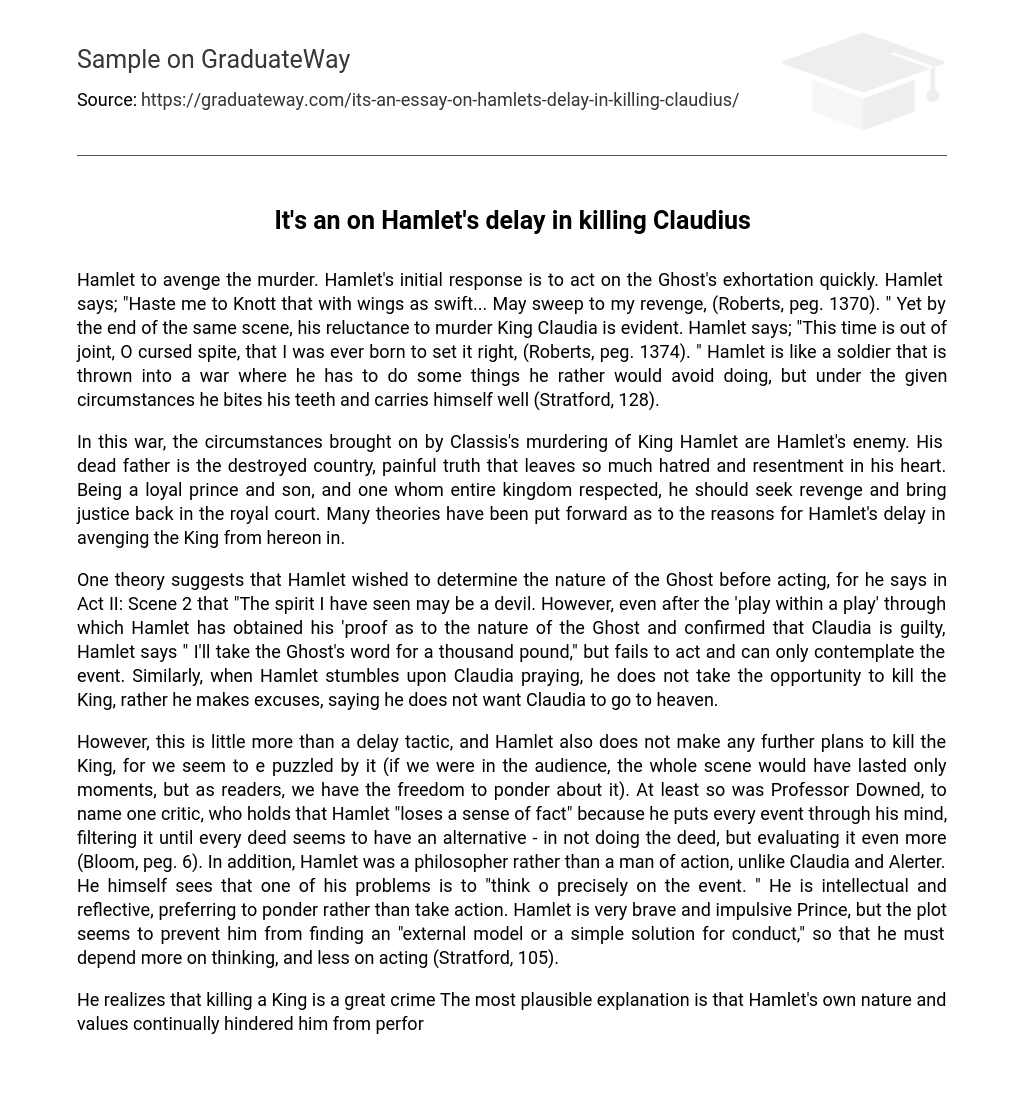Hamlet to avenge the murder. Hamlet’s initial response is to act on the Ghost’s exhortation quickly. Hamlet says; “Haste me to Knott that with wings as swift… May sweep to my revenge, (Roberts, peg. 1370). ” Yet by the end of the same scene, his reluctance to murder King Claudia is evident. Hamlet says; “This time is out of joint, O cursed spite, that I was ever born to set it right, (Roberts, peg. 1374). ” Hamlet is like a soldier that is thrown into a war where he has to do some things he rather would avoid doing, but under the given circumstances he bites his teeth and carries himself well (Stratford, 128).
In this war, the circumstances brought on by Classis’s murdering of King Hamlet are Hamlet’s enemy. His dead father is the destroyed country, painful truth that leaves so much hatred and resentment in his heart. Being a loyal prince and son, and one whom entire kingdom respected, he should seek revenge and bring justice back in the royal court. Many theories have been put forward as to the reasons for Hamlet’s delay in avenging the King from hereon in.
One theory suggests that Hamlet wished to determine the nature of the Ghost before acting, for he says in Act II: Scene 2 that “The spirit I have seen may be a devil. However, even after the ‘play within a play’ through which Hamlet has obtained his ‘proof as to the nature of the Ghost and confirmed that Claudia is guilty, Hamlet says ” I’ll take the Ghost’s word for a thousand pound,” but fails to act and can only contemplate the event. Similarly, when Hamlet stumbles upon Claudia praying, he does not take the opportunity to kill the King, rather he makes excuses, saying he does not want Claudia to go to heaven.
However, this is little more than a delay tactic, and Hamlet also does not make any further plans to kill the King, for we seem to e puzzled by it (if we were in the audience, the whole scene would have lasted only moments, but as readers, we have the freedom to ponder about it). At least so was Professor Downed, to name one critic, who holds that Hamlet “loses a sense of fact” because he puts every event through his mind, filtering it until every deed seems to have an alternative – in not doing the deed, but evaluating it even more (Bloom, peg. 6). In addition, Hamlet was a philosopher rather than a man of action, unlike Claudia and Alerter. He himself sees that one of his problems is to “think o precisely on the event. ” He is intellectual and reflective, preferring to ponder rather than take action. Hamlet is very brave and impulsive Prince, but the plot seems to prevent him from finding an “external model or a simple solution for conduct,” so that he must depend more on thinking, and less on acting (Stratford, 105).
He realizes that killing a King is a great crime The most plausible explanation is that Hamlet’s own nature and values continually hindered him from performing the task. Hamlet is a sensitive, introverted young man, who is naturally prone to melancholia. Coleridge and Goethe would agree with this, holding that Hamlet’s soul is too philosophical and it lacks ability to instinctual act on impulse, and that he is “too sensitive to avenge himself,” (Grainier, peg. 159).
But if one only reads what goes on in the play, Hamlet could by no means be called too sensitive or passive. The Ghost’s revelation and also the fact that his mother has remarried to King Claudia, intensify his already melancholic disposition. His mother’s remarriage is an abomination in Hamlet’s eyes. This is because the marriage was soon after his father’s death; King Hamlet was “But three months dead. ” This shows little sensitivity to those who are grieving and also implies that their relationship was initiated before King Hamlet died.
Secondly, the marriage was against canon law, which made it a sin. Hamlet says to his mother in Act Ill: Scene 4, “Have you not eyes? You cannot call it love. O shame! Where is thy blush? ” These successive shocks deepen Hamlet’s depression. In Act II: Scene 2 Hamlet says to Reassurance and Guilelessness, “l have of late… Lost all my mirth. ” He falls deeper and deeper into the slough of fruitless brooding. In his first soliloquy he says; ‘O that this too solid flesh would melt. Thus, the task is too onerous for the fragile, melancholic Hamlet.
Hamlet also delays killing the King because he is unsure of the morality of carrying out such a task. This factor is important, as Hamlet is a very idealistic and moralistic person. Revenge was prohibited by ecclesiastical law, but the duty of ‘personal honor’ prevalent in Elizabethan times often won through. In the play, Hamlet debates the morality of revenge, saying that “lass’s not perfect conscience and isn’t not to be damned to let this canker of our nature come in further evil. ” At this Stage it is clear that Hamlet is having serious bouts about killing the King.
After all, to kill an anointed King, even in an act of revenge, was considered a serious offence. Furthermore, as Hamlet points out in the above quote, he would be carrying out the very act he was condemning. In addition, in regards to his mother’s sin, the ghost had told Hamlet to “leave her to heaven. ” This creates a moral dilemma for Hamlet because if it is God’s duty to deal with his Mother’s sin, surely the same applies to Claudia. In conclusion, Hamlet delays in killing the King because of his own character; he is a philosopher and is of a melancholic disposition.





